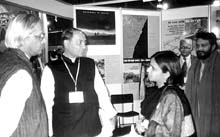|
Even in a scene, which was as spectacular, chaotic and confusing as a circus, it was a lone, odd voice. While all the participants were harping on water scarcity, a pamphlet doing the rounds at the Second World Water Forum, held at The Hague in the Netherlands from March 16 to 22, 2000 pleaded "there is no water scarcity,". It urged all parties at the largest international gathering on water policy in history to stop sponsoring water scarcity and start addressing the gross mismanagement of water.
This was the voice of the New Delhi-based Centre for Science and Environment (CSE) the only non-governmental organisation (NGO) from the South to participate independently in the forum. In an event dominated by anti-dam activists, private sector companies, and ministers and government representatives, it was an effort to come up with something positive. Making a clear point that water scarcity was a child of water mismanagement and the solution lay in a change in the mindset of the policy-makers. The five-day forum included a two-day ministerial conference, which culminated in "the Hague ministerial declaration on water security in the 21st century", a watered-down document widely described as a disappointment. More than 3,500 participants, 500 delegation members, 400 journalists and 118 ministers participated in the forum and the parallel ministerial conference. Registered participants from India accounted for 99 of them. The objectives of the forum were two-fold:
The forum opened with several calls for rapid solutions to the world’s growing water crisis—one billion people lack access to safe drinking water and two billion people lack water for safe sanitation. "The number of people participating and the interest of the media in the event must help increase the world-wide awareness of the water crisis," said Willem Alexander of Orange, crown prince of the Netherlands and the chairperson of the forum, speaking at the end of the first day’s proceedings. "This already means that one of our important objectives is satisfied." The event was inaugurated by Mahmoud Abu Zeid, Egypt’s minister of water resources and irrigation who is also the president of the World Water Council, and Ismail Serageldin, vice president of the World Bank who is also the chairperson of the World Water Commission. So single-minded were the anti-dam protestors that every issue relating to water boiled down to a loud "say no to dams". The protestors overlooked even positive examples of communities managing their own water resources and exercising their ‘water rights’. At the session on NGOs and water, Sunita Narain, deputy director of CSE, talked about the Arvari River Parliament of Rajasthan, where village communities are managing a river that they have revived by building small, earthen checkdams called johads. A US based NGO– International Rivers Network had only one comment to make: "But India also has the Sardar Sarovar Dam over the Narmada." Observers noted that the unwillingness of anti-dam protestors to accept anything positive, even if it came from rural communities was actually doing disservice to their own cause. Sparks flew during the session on water and energy when the Gujarat minister for Narmada, Jai Narain Vyas, and those opposed to the dam got into a heated debate. There was a major presence of the private sector—the fair was dotted with far too many private enterprises — as well as the low representation of national governments and the virtually no presence of the civil society of the South. The finale of the forum — the draft ministerial declaration — came as a damp squib to many experts who felt that the declaration was too weak. The Hague ministerial declaration on water security in the 21st century recognised the diversity of needs and situations from around the globe. To achieve water security, the seven challenges covered were :
The ministerial delegation advocated that actions be based on integrated water resource
management (IWRM) — with land and water planning that takes into account social,
economic and environmental factors — as well as integrating surface water,
groundwater and the ecosystems through which Apart from political commitment, IWRM requires collaboration at all levels. The ministers agreed to ‘advance’ the process of collaboration and to set targets, devise strategies and develop a set of indicators of progress. The declaration called upon all agencies of the United Nations and international financial institutions to review their policies and programmes. The declaration also welcomed the follow-up actions by all parties concerned in an open and participatory manner. Though the recommendations of the various sessions were discussed during the ministerial round, these were not endorsed. Instead, ministers agreed on a set of guidelines for their respective governments to address water management issues, such as securing food supplies, protecting ecosystems and managing risks including floods, drought and pollution. NGOs and major trade union groups did not accept the mandate of the Anil Agarwal, director of CSE and a member of the World Water Commission, is severe in his criticism of the ministerial declaration: "It was an absolute and utter disappointment. Almost as if the politicians are just not prepared to confront any of the realities and want to continue wasting and polluting water under the aegis of our State agencies. The ministerial declaration makes no mention of the need to price water and, therefore, ensure that the benefits of the subsidies do not go to the richer sections of the developing world." "Neither did the ministerial statement mention anything about the involvement of the private sector, the changing role of the State or the participation of local. The ministers should have discussed the privatisation issue and come to some conclusion because if they do not want to privatise, then they will have ensure that government water supply agencies actually function effectively and with transparency. It is going to be a tall order to bring about such improvements in government agencies. But the ministers, of course, just totally ducked all these issues," observes Agarwal. |

